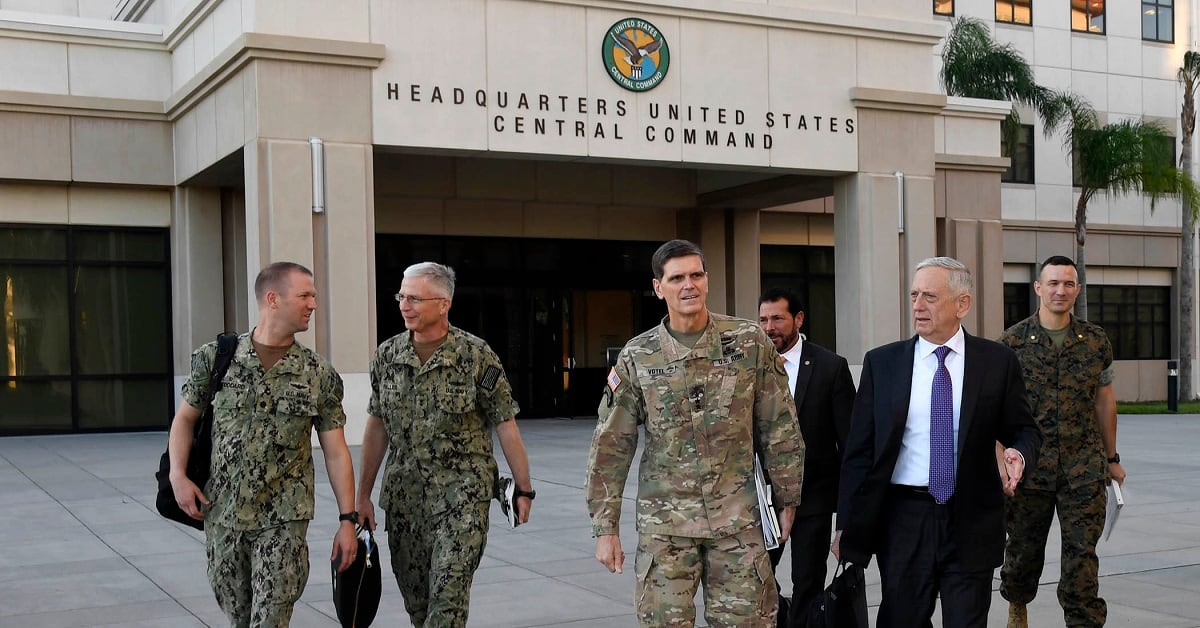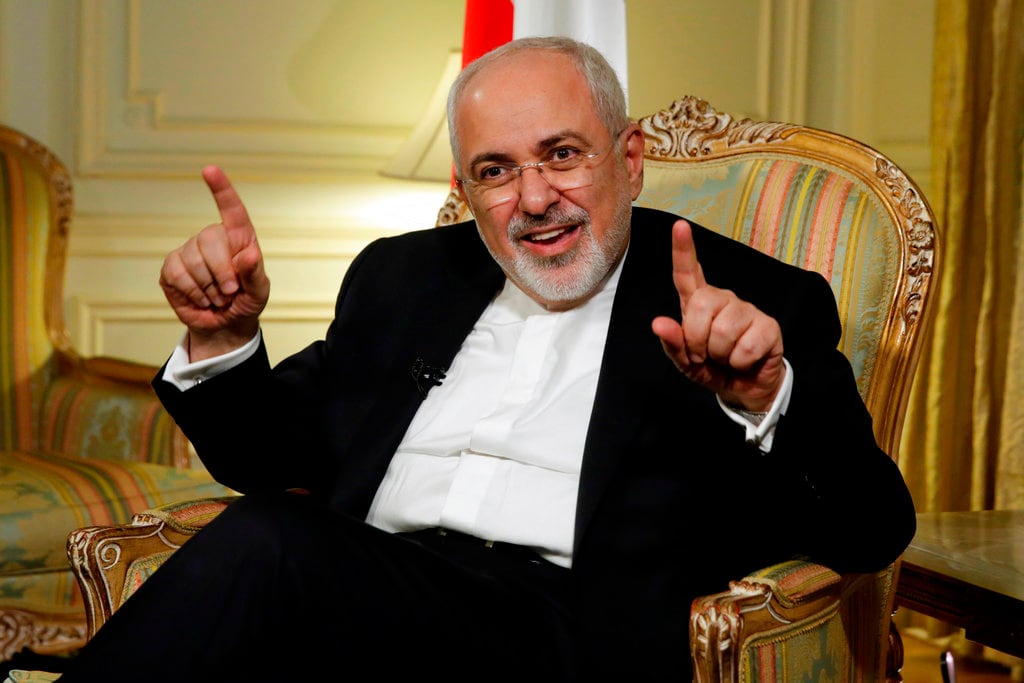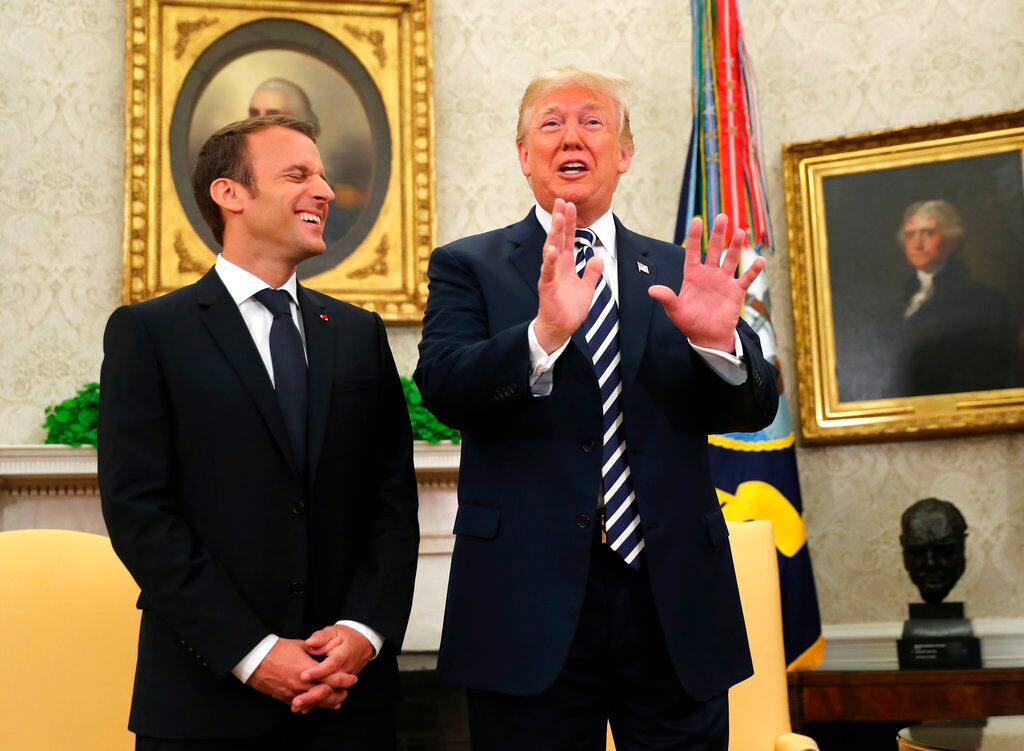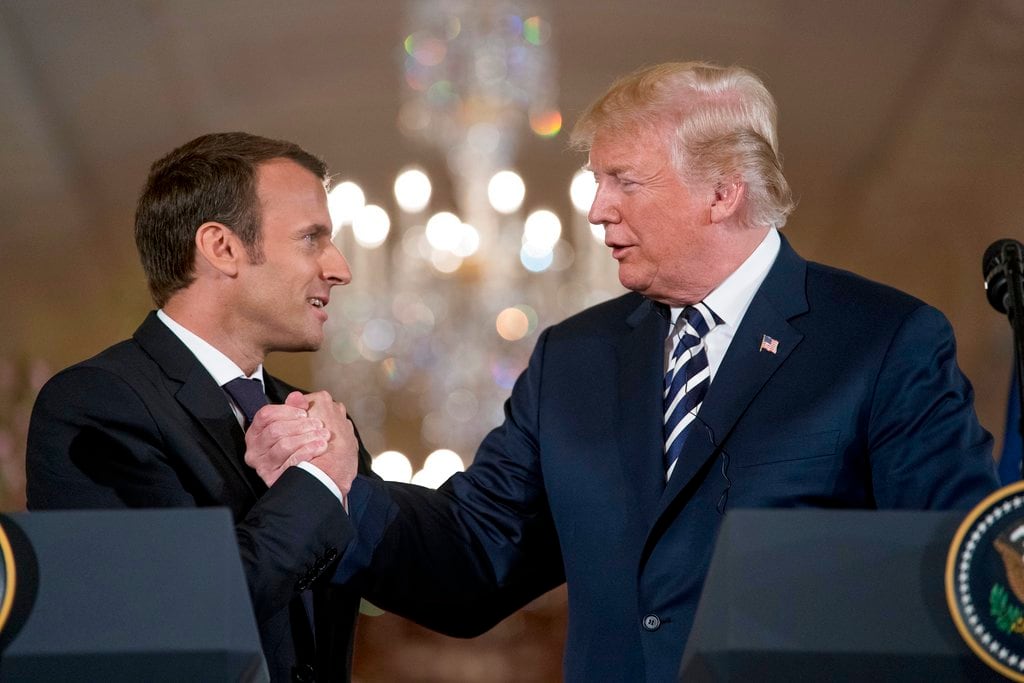WASHINGTON — Weighing U.S. withdrawal from the Iran nuclear accord, President Donald Trump declared on Tuesday that if the Iranians “restart their nuclear program, they will have bigger problems than they’ve ever had before.”
Trump issued his warning alongside French President Emmanuel Macron in the Oval Office, where the two allies discussed the multinational nuclear agreement, the war in Syria and trade issues during a day of meetings at the White House.
Speaking at a joint news conference Tuesday, Trump appeared to be more in line with Macron’s push for a longer-term U.S. presence in Syria. Trump, who announced weeks ago that he would withdraw American troops, said Macron reinforced the idea of a potential Iranian takeover of territory liberated from the Islamic State group.
“We’ll be coming home,” Trump said, “but we want to leave a strong and lasting footprint.”
RELATED

Macron told Trump that together the U.S. and France would defeat terrorism, curtail weapons of mass destruction in North Korea and Iran and act together on behalf of the planet, a reference to Macron’s work to revive a U.S. role in the Paris climate accord.
As for Iran, Trump was asked by reporters if he might be willing to stay in the Iran agreement. He replied, “People know my views on the Iran deal. ... It’s insane, it’s ridiculous. It should have never been made.”
One of Macron’s main objectives during his three-day visit to Washington is to persuade Trump to stay in the accord, which is aimed at restricting Iran’s development of nuclear weapons. Trump, skeptical of the pact’s effectiveness, has been eager to pull out as a May 12 deadline nears.

Iranian Foreign Minister Mohammad Javad Zarif warned the Trump administration Tuesday that pulling out would undermine America’s talks with North Korea by proving the U.S. reneges on its promises.
He told The Associated Press in an interview that if Trump withdraws, Iran would “most likely” abandon the deal as well. Speaking before Trump’s comments with Macron, Zarif added that Iran would no longer be bound by the deal’s international obligations. That would free Iran to resume enrichment activity beyond the limits imposed by the 2015 accord.
Trump remains publicly undecided on the deal, saying Tuesday “no one knows” what he’ll do at the deadline he set to determine America’s position. But he reminded his French counterpart of what he sees as flaws in the agreement, which he said fails to address ballistic missiles or Iran’s activities in Yemen or Syria.
Macron told reporters that he and Trump would look at the Iran deal “in a wider regional context,” taking into account the situation in Syria. “We have a common objective, we want to make sure there’s no escalation and no nuclear proliferation in the region. We now need to find the right path forward,” Macron said.
RELATED

Trump suggested he was open to “doing something” on the Iran agreement as long as it was done “strongly.” He told Macron, “We could have at least an agreement among ourselves very quickly.” But when he was asked by reporters what that agreement would be, Trump said, “You’ll find out.”
During the press conference, Macron added that he and Trump discussed pursuing a “new agreement” with Iran on the broader regional concerns, including Syria. But it was not clear whether Trump would be willing to keep the U.S. in the current deal, known as the Joint Comprehensive Plan of Action, in the meantime.
U.S. military and intelligence officials have urged Trump not to pull out of the agreement, arguing it has halted Iran’s nuclear program.
Trump also informed Macron that North Korean leader Kim Jong Un wanted to meet “as soon as possible.” The president, who once derided Kim as “Little Rocket Man,” said the North Korean dictator had been “very open” and “very honorable” so far.

Domestic concerns were also near the surface for Trump. He refused to answer a reporter’s question as to whether he is considering a pardon for his personal lawyer, Michael Cohen, whose office was raided by the FBI. Trump called it “a stupid question.” Cohen has not been charged in the case.
As Trump hosted the French president for the first official state visit of his administration, he and Macron lavished praise — and even a pair of kisses — on one another Tuesday. “It’s an honor to call you my friend,” Trump said, after predicting Macron would be a historic leader of France.
In a lighter moment, Trump and Macron demonstrated some of the chemistry that has marked their relationship. The U.S. president brushed something off Macron’s suit jacket, saying, “We have a very special relationship, in fact I’ll get that little piece of dandruff off.” Trump added, “We have to make him perfect — he is perfect.”
The meetings followed a pomp-filled welcome ceremony on the South Lawn. Trump said before an audience of U.S. soldiers and members of his Cabinet that the relationship he forged with Macron at the start of his presidency was a testament to the “enduring friendship that binds our two nations.” He thanked the French leader for his “steadfast partnership” in the recent missile strike in response to the chemical attack in Syria.
Macron said, “History is calling us. It is urging our people to find the fortitude that has guided us in the most difficult of times. France and with it, Europe, and the United States have an appointment with history.”
The social highlight of Macron’s visit comes Tuesday night with a lavish state dinner at the White House. About 150 guests are expected to dine on rack of lamb and nectarine tart and enjoy an after-dinner performance by the Washington National Opera. On Monday night, the leaders took a helicopter tour of Washington landmarks and had dinner at the Potomac River home of George Washington in Mount Vernon, Virginia.
Tuesday’s meetings follow the collaboration by the U.S., France and Britain in missile strikes in Syria earlier this month to respond to the alleged chemical weapons attack. The U.S. has 2,000 troops in Syria assisting local Arab and Kurdish fighters against IS, though Trump has resisted a deeper U.S. involvement and is eager to withdraw completely from Syria.
Macron’s three-day visit to Washington underscores the importance that both sides attach to the relationship: Macron, who calls Trump often, has emerged as something of a “Trump whisperer” at a time when the American president’s relationships with other European leaders are more strained. Trump, who attaches great importance to the optics of pageantry and ceremony, chose to honor Macron with the first state visit of his administration as he woos the French president.
Trump ended his first year in office without receiving a foreign leader on a state visit, the first president in nearly 100 years to fail to do so. He was Macron’s guest last July at the annual Bastille Day military parade in the center of Paris. Macron and his wife also took Trump and first lady Melania Trump on a tour of Napoleon’s tomb and whisked them up in the Eiffel Tower for dinner overlooking the City of Light.
Macron was welcomed back to the White House on Tuesday with a traditional arrival ceremony featuring nearly 500 members of the U.S. military and a booming 21-gun salute. He was also attending a State Department lunch hosted by Vice President Mike Pence.
Associated Press writers Zeke Miller and Jonathan Lemire contributed.




